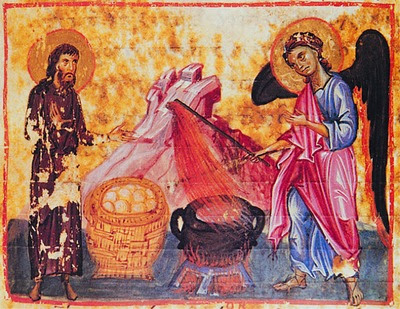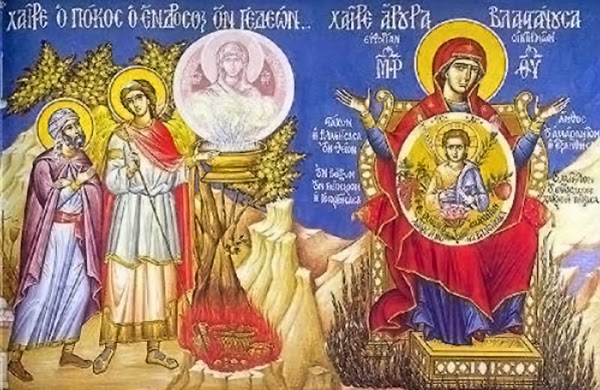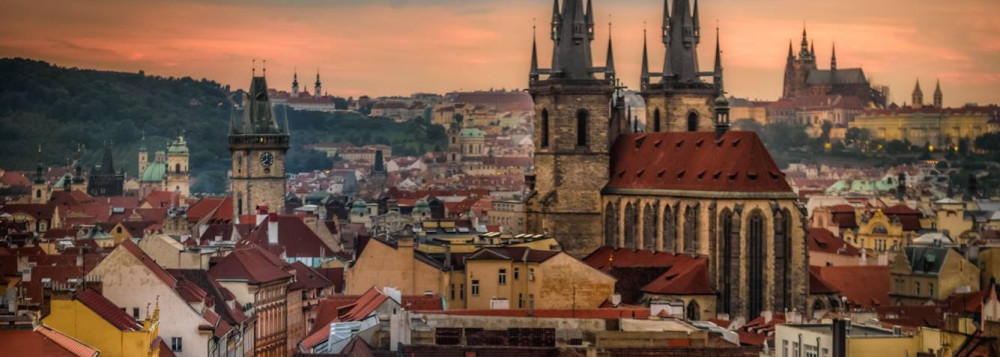

I recently wrote about St. Mary Major and the miracle of the snow in Rome. I realized this morning how similar the story about St. Mary Major is to the story of Gideon and the miracle of the fleece in the Old Testament.
In the book of Judges (chapter 6), we read that Gideon was told by an angel that he would save the people of Israel from their enemies as they were settling the Promised Land after wandering in the desert for 40 years after the Exodus. But Gideon wants reassurance that God would fulfil this promise that he would lead the people to victory. He tells the angel,
“If now I have found favor in your eyes, then show me a sign that it is you who speak with me. Please do not depart from here until I come to you and bring out my present and set it before you.” And the angel said, “I will stay till you return.”
So Gideon went into his house and prepared a young goat and unleavened cakes from an ephah of flour. The meat he put in a basket, and the broth he put in a pot, and brought them to him under the terebinth and presented them. And the angel of God said to him, “Take the meat and the unleavened cakes, and put them on this rock, and pour the broth over them.” And he did so. Then the angel of the Lord reached out the tip of the staff that was in his hand and touched the meat and the unleavened cakes. And fire sprang up from the rock and consumed the meat and the unleavened cakes. And the angel of the Lord vanished from his sight. Then Gideon perceived that he was the angel of the Lord. And Gideon said, “Alas, O Lord God! For now I have seen the angel of the Lord face to face.” But the Lord said to him, “Peace be to you. Do not fear; you shall not die.”
After Gideon wins a series of battles, the enemies of Israel gather large reinforcements and Gideon calls for more Israelites to join him. While he is hoping the Israelites will respond to his call and come to join him, we are told that
… Gideon said to God, “If you will save Israel by my hand, as you have said, behold, I am laying a fleece of wool on the threshing floor. If there is dew on the fleece alone, and it is dry on all the ground, then I shall know that you will save Israel by my hand, as you have said.” And it was so. When he rose early next morning and squeezed the fleece, he wrung enough dew from the fleece to fill a bowl with water. Then Gideon said to God, “Let not your anger burn against me; let me speak just once more. Please let me test just once more with the fleece. Please let it be dry on the fleece only, and on all the ground let there be dew.” And God did so that night; and it was dry on the fleece only, and on all the ground there was dew.
Christian preachers always associated both the miracle of the sacrifice consumed by fire and the miracle of the fleece with the Incarnation of the Word of God in the womb of the Virgin Mary. St. Ambrose of Milan preached, “as soon as the Angel touched them with the end of the staff which he bore, fire burst forth out of the rock, and so the sacrifice which he was offering was consumed. By which it seems clear that that rock was a figure of the Body of Christ, for it is written: “They drank of that rock that followed them, and that rock was Christ.” (1 Cor. 10:4)
Other early Christian writers, such as St. Proclus of Constantinople describe the Blessed Virgin as the “loom” of the incarnation and linked the miracle of the fleece with Mary: “The holy Mary has called us together, that undefiled treasure of virginity… the most pure fleece with heavenly dew, from which the Shepherd clothed the sheep… She is the awe-inspiring loom of the incarnation.”
The dew on the fleece that announces God’s choice of Gideon is remarkably similar to the snowfall that announces God’s choice of the building site for the church of St. Mary Major in Rome. Both miracles announce to the world what God has previously revealed to only a few people and both miracles are associated with the Mother of God whose consent made the incarnation possible.
